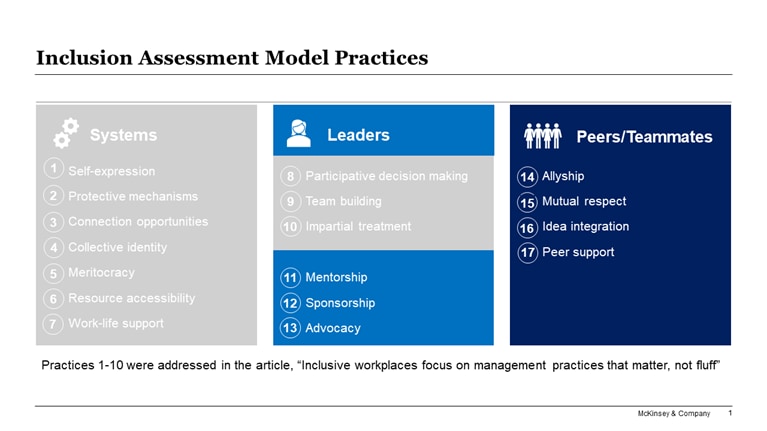Previously, we described the basic building blocks of the McKinsey inclusion assessment and the 10 key management practices to enhance employees’ perceptions of organizational inclusivity. We now shift our attention to the seven practices that help improve employees’ personal experience of inclusion. These are categorized into what peers/teammates do to support their colleagues and how leaders can help diverse teams thrive.
While most organizations adopt policies and programs to protect employees from mistreatment and discrimination, these steps are essentially table stakes. Often overlooked are the personal experiences of inclusion driven by employees’ daily interactions with peers/teammates and leaders.

Peers/Teammates: Creating a safe, collaborative environment
Employees’ daily encounters with peers and teammates largely shape what is socially accepted, which ideas get heard, and whether bias is challenged or amplified. Research on workforce diversity and allyship point to four key practices peers/teammates can adopt to enhance personal experiences of inclusion:
- 1. Allyship: Supporting and learning about other employees with diverse backgrounds and experiences.
- 2. Mutual respect: Showing genuine concern for each other’s well-being and a commitment to treating each other fairly and respectfully.
- 3. Idea integration: Being open and receptive to others’ ideas and opinions, even if they are different from one’s own.
- 4. Peer support: Helping each other and inspiring confidence in one another’s ability to meet work goals.
One professional sports organization doubled down on these practices as part of its diversity, equity, and inclusion (DE&I) journey. The organization created an ally network that truly taught employees how to be an ally, including responding to microaggressions and building supportive micro-habits. However, they still found that many employees avoided speaking up for fear of making matters worse.
To address this, the organization rolled out guides to help employees engage in deliberate conversations to embark on a journey of repair when unintended consequences inevitably happened. Employees soon reported greater comfort with allyship and higher levels of inclusion, especially within underrepresented employee populations.
Leaders: Nurturing teams at a person level
One critical role of leaders is to ensure that all team members have access to the coaching and growth opportunities they need. This is particularly important for underrepresented groups, which report seeing fewer of these opportunities. Research on employee development and social capital points to three practices to help employees advance their careers, find meaning, and feel that they belong:
- 5. Mentorship: Supporting employees’ development and career growth (e.g., coaching, career advice, feedback).
- 6. Sponsorship: Taking ownership of employees’ careers and behaving as their advocates in the organization.
- 7. Advocacy: Showing genuine concern for employees’ well-being and accommodating their specific needs.
A fast-growing global biotech company noticed that women and people of color were not advancing at the same pace as their dominant peer group and were leaving at substantially higher rates, creating a shortage of crucial talent. In response, it created a sponsorship program to support employee advancement.
To avoid bias, it deployed a survey to understand employees’ needs and preferences, then matched them with sponsors best positioned to support their goals. Members of underrepresented groups reported an increase in sponsorship opportunities, along with stronger retention rates and increased sentiment towards staying long term.
Inclusion impacts outcomes and is simply the right thing to do
These practices help employees feel that they belong, their individual contributions are valued, and their work is meaningful and aligned to the organization’s purpose and mission. Employees who feel included are more likely to be engaged at work and less likely to leave.
Given the seismic impact of the pandemic on talent management and the increasing importance employees place on DE&I, companies can’t ignore the importance of inclusion in attracting and retaining talent. Organizations that crack the code on improving the inclusive individual experience for employees can achieve stronger diverse outcomes at a much swifter pace.
The authors would like to thank Shannon Cheng, Aaron De Smet, Diana Ellsworth, Ruth Imose, Vidya Mahadevan, and Bill Schaninger for their meaningful contributions to this post.


